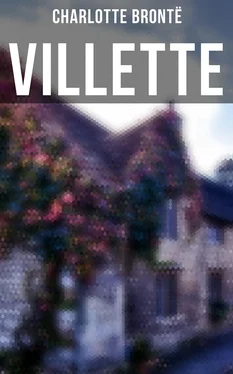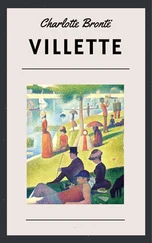1 ...6 7 8 10 11 12 ...31 “A very unique child,” thought I, as I viewed her sleeping countenance by the fitful moonlight, and cautiously and softly wiped her glittering eyelids and her wet cheeks with my handkerchief. “How will she get through this world, or battle with this life? How will she bear the shocks and repulses, the humiliations and desolations, which books, and my own reason, tell me are prepared for all flesh?”
She departed the next day; trembling like a leaf when she took leave, but exercising self-command.
Chapter IV.
Miss Marchmont.
Table of Contents
On quitting Bretton, which I did a few weeks after Paulina’s departure — little thinking then I was never again to visit it; never more to tread its calm old streets — I betook myself home, having been absent six months. It will be conjectured that I was of course glad to return to the bosom of my kindred. Well! the amiable conjecture does no harm, and may therefore be safely left uncontradicted. Far from saying nay, indeed, I will permit the reader to picture me, for the next eight years, as a bark slumbering through halcyon weather, in a harbour still as glass — the steersman stretched on the little deck, his face up to heaven, his eyes closed: buried, if you will, in a long prayer. A great many women and girls are supposed to pass their lives something in that fashion; why not I with the rest?
Picture me then idle, basking, plump, and happy, stretched on a cushioned deck, warmed with constant sunshine, rocked by breezes indolently soft. However, it cannot be concealed that, in that case, I must somehow have fallen overboard, or that there must have been wreck at last. I too well remember a time — a long time — of cold, of danger, of contention. To this hour, when I have the nightmare, it repeats the rush and saltness of briny waves in my throat, and their icy pressure on my lungs. I even know there was a storm, and that not of one hour nor one day. For many days and nights neither sun nor stars appeared; we cast with our own hands the tackling out of the ship; a heavy tempest lay on us; all hope that we should be saved was taken away. In fine, the ship was lost, the crew perished.
As far as I recollect, I complained to no one about these troubles. Indeed, to whom could I complain? Of Mrs. Bretton I had long lost sight. Impediments, raised by others, had, years ago, come in the way of our intercourse, and cut it off. Besides, time had brought changes for her, too: the handsome property of which she was left guardian for her son, and which had been chiefly invested in some joint-stock undertaking, had melted, it was said, to a fraction of its original amount. Graham, I learned from incidental rumours, had adopted a profession; both he and his mother were gone from Bretton, and were understood to be now in London. Thus, there remained no possibility of dependence on others; to myself alone could I look. I know not that I was of a self-reliant or active nature; but self-reliance and exertion were forced upon me by circumstances, as they are upon thousands besides; and when Miss Marchmont, a maiden lady of our neighbourhood, sent for me, I obeyed her behest, in the hope that she might assign me some task I could undertake.
Miss Marchmont was a woman of fortune, and lived in a handsome residence; but she was a rheumatic cripple, impotent, foot and hand, and had been so for twenty years. She always sat upstairs: her drawing-room adjoined her bedroom. I had often heard of Miss Marchmont, and of her peculiarities (she had the character of being very eccentric), but till now had never seen her. I found her a furrowed, grey-haired woman, grave with solitude, stern with long affliction, irritable also, and perhaps exacting. It seemed that a maid, or rather companion, who had waited on her for some years, was about to be married; and she, hearing of my bereaved lot, had sent for me, with the idea that I might supply this person’s place. She made the proposal to me after tea, as she and I sat alone by her fireside.
“It will not be an easy life;” said she candidly, “for I require a good deal of attention, and you will be much confined; yet, perhaps, contrasted with the existence you have lately led, it may appear tolerable.”
I reflected. Of course it ought to appear tolerable, I argued inwardly; but somehow, by some strange fatality, it would not. To live here, in this close room, the watcher of suffering — sometimes, perhaps, the butt of temper — through all that was to come of my youth; while all that was gone had passed, to say the least, not blissfully! My heart sunk one moment, then it revived; for though I forced myself to realise evils, I think I was too prosaic to idealise, and consequently to exaggerate them.
“My doubt is whether I should have strength for the undertaking,” I observed.
“That is my own scruple,” said she; “for you look a worn-out creature.”
So I did. I saw myself in the glass, in my mourning-dress, a faded, hollow-eyed vision. Yet I thought little of the wan spectacle. The blight, I believed, was chiefly external: I still felt life at life’s sources.
“What else have you in view — anything?”
“Nothing clear as yet: but I may find something.”
“So you imagine: perhaps you are right. Try your own method, then; and if it does not succeed, test mine. The chance I have offered shall be left open to you for three months.”
This was kind. I told her so, and expressed my gratitude. While I was speaking, a paroxysm of pain came on. I ministered to her; made the necessary applications, according to her directions, and, by the time she was relieved, a sort of intimacy was already formed between us. I, for my part, had learned from the manner in which she bore this attack, that she was a firm, patient woman (patient under physical pain, though sometimes perhaps excitable under long mental canker); and she, from the goodwill with which I succoured her, discovered that she could influence my sympathies (such as they were). She sent for me the next day; for five or six successive days she claimed my company. Closer acquaintance, while it developed both faults and eccentricities, opened, at the same time, a view of a character I could respect. Stern and even morose as she sometimes was, I could wait on her and sit beside her with that calm which always blesses us when we are sensible that our manners, presence, contact, please and soothe the persons we serve. Even when she scolded me — which she did, now and then, very tartly — it was in such a way as did not humiliate, and left no sting; it was rather like an irascible mother rating her daughter, than a harsh mistress lecturing a dependant: lecture, indeed, she could not, though she could occasionally storm. Moreover, a vein of reason ever ran through her passion: she was logical even when fierce. Ere long a growing sense of attachment began to present the thought of staying with her as companion in quite a new light; in another week I had agreed to remain.
Two hot, close rooms thus became my world; and a crippled old woman, my mistress, my friend, my all. Her service was my duty — her pain, my suffering — her relief, my hope — her anger, my punishment — her regard, my reward. I forgot that there were fields, woods, rivers, seas, an ever-changing sky outside the steam-dimmed lattice of this sick chamber; I was almost content to forget it. All within me became narrowed to my lot. Tame and still by habit, disciplined by destiny, I demanded no walks in the fresh air; my appetite needed no more than the tiny messes served for the invalid. In addition, she gave me the originality of her character to study: the steadiness of her virtues, I will add, the power of her passions, to admire; the truth of her feelings to trust. All these things she had, and for these things I clung to her.
Читать дальше












